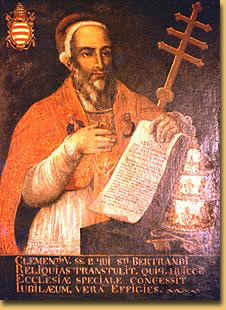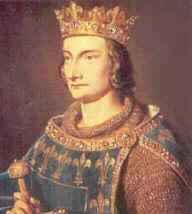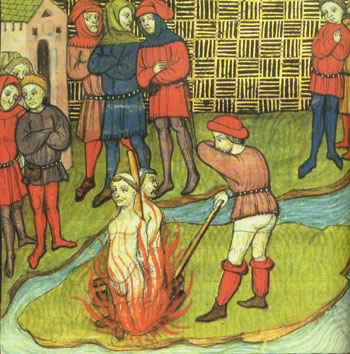|
Clement V Bertrand de Got was born to a wine-making family in France, before rising to become the Archbishop of Bordeaux (no relation to the King of Beers). His older brother had been a cardinal and a vintner, and Bertie had lived the good life as a medieval bishop—studying law, the arts, and the science of grapes, with theology almost an afterthought.
Bertrand de Got was born to a wine-making family in France, before rising to become the Archbishop of Bordeaux (no relation to the King of Beers). His older brother had been a cardinal and a vintner, and Bertie had lived the good life as a medieval bishop—studying law, the arts, and the science of grapes, with theology almost an afterthought. With all these interests and a fair amount of money to his name, Bertie became good pals with French King Philip IV. Philip (known as "the Fair" for his David Lee Roth-like locks) had been making life miserable for Pope Boniface VIII, with whom the monarch had differed over the issue of whether priests should pay taxes. (Boniface was of the opinion that rendering unto Caesar was strictly for losers.) In the end, Philip made Boniface's life so miserable that it ended prematurely after a violent fever. His successor, Benedict XI, died after a few months under suspicious circumstances, very probably at the hands of one of Philip's agents. Uncharacteristically humbled by this experience, the cardinals of the Curia were split over whether to mount a defense against Philip's rapacious greed or simply throw in the towel. After nearly a year of dickering between Frank and Italic cardinals, the towel won out. As a placatory move, Bertrand was named to the papacy. Taking the name Clement V, he immediately set about transforming the church into a plaything for the French. The French reign of terror began before the papacy even started. When the cardinals invited Clement to Rome for his coronation, he instead invited the cardinals to Lyons, France, where Philip could keep a watchful eye on the proceedings. Ungracefully, the pope fell off his horse and lost the most valuable jewel in the papal crown. (No one checked Philip's pockets after the accident.) The bad omen was duly noted, and well taken. The new pope set up shop in France, trying out a variety of country estates until settling down in Avignon. He installed his brother at the head of the church's political holdings, then proceeded to bend over for Philip—over and over and over again. His sloppy governance led to revolt, and Clement had to launch a Crusade to retake papal terrorities from the warlords of Venice.
Clement stalled, attempting to appease Philip with increasingly generous bequests of church land and property. He also retracted every bad thing the church had ever said about Philip and canceled every policy precedent that had ever displeased the French king. Yet Philip was not placated, or rather he was keen to perceive that he could get plenty more mileage out of this weak-kneed pontiff. The demands continued, and the sacrificial lambs became even fatter. The fattest lamb of all was the Order of the Knights Templar. The centuries-old secret society had made its home in the Albigensian region of France, where it presumably stored its rumored-to-be-unthinkable treasure. The Order had also toted up a fair account balance with Philip, who was loath to pay.
Even this did not satisfy "the Fair". He wanted Boniface's head on a platter (literally, if possible), and he kept on badgering Clement until he got his way. On 2 February 1309, Clement dug up Boniface (but only metaphorically), and placed him on trial for crimes against French humanity. The proceedings dragged on for several years, in part because of Clement's reluctance. Surprisingly, after all the years of persistence, Philip finally abandoned the cause—in exchange for a full papal pardon for Philip and his cronies in regard to any acts of canonical impropriety that might have occurred during his long reign of terror. Every word ever uttered by a pope which could be construed as unfavorable to Philip was literally erased from the papal library. The trial quietly faded from public view—it was unclear whether a verdict had ever been reached. Clement died in April of 1314. Highly agitated by all that had come to pass, the council of cardinals began a heroic battle over his successor—a task made easier when Philip kicked the bucket later that year. Although the papacy eventually managed to rebuild its religious credibility, its political clout never fully recovered from from the enthusiasm and skill with which Philip made Clement his bitch. This may be one reason why Nostradamus kicks off his prophecy of the end times with the papacy's return to Avignon. Or maybe, like so many others, he just hated the French.
|
 Within minutes of his installment, Philip began lobbying Clement to soil the memory of Boniface, the pope who had dared stand up to him. Philip wanted Boniface declared a heretic and posthumously disempoped, and he wanted to dig up the corpse for some fun and games too (surprisingly, this was not an
Within minutes of his installment, Philip began lobbying Clement to soil the memory of Boniface, the pope who had dared stand up to him. Philip wanted Boniface declared a heretic and posthumously disempoped, and he wanted to dig up the corpse for some fun and games too (surprisingly, this was not an  While there were plenty of reasons why a pope might want to get rid of the Templars (like
While there were plenty of reasons why a pope might want to get rid of the Templars (like